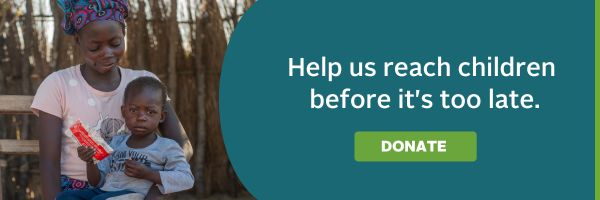Empowering Adolescents to Break Barriers

Memory, enrolled in the Kusamala Children in Families initiative, graduated from a one-year technical program at Lusaka Business and Technical College. Photo by Access to Health Zambia.
On World Youth Skills Day, we celebrate the importance of helping adolescents gain the skills they need to support themselves through employment and entrepreneurship. With greater economic opportunity, young people can help lift themselves—and their families—out of poverty.
That’s what CMMB is working to achieve in Zambia. Extreme poverty has separated far too many children from their families. Many family separations occur because parents struggle to provide financially for their children, especially for their education. Unable to afford school fees, parents make a painful choice, sending their child to an institution so they receive basic care and an education. Other young people leave home in search of opportunity, only to end up surviving on the streets. Through our Kusamala Children in Families initiative, CMMB affiliate Access to Health Zambia supports youth empowerment, connecting young people who have been separated from their families to education and vocational training—and helping them reintegrate into their families.
We are honored to share the story of a resilient young Zambian woman. With our support and her hard work, she overcame significant challenges to reunite with her family and secure an education—creating a more hopeful future for herself.
Memory’s Story
Life has been challenging for Memory, a 23-year-old from Lusaka, Zambia’s capital. One of seven siblings, Memory saw her mother struggle to provide financially for her large family. At a young age, she was sent to live with her aunt to ease the financial burden.
In her new home, Memory was hopeful that she could do what so many in her family have been unable to: stay in school and graduate. But in Zambia, where more than 70% of the country’s 20.7 million people live in poverty, Memory’s aunt was soon struggling to provide for her, too.
Like many Zambian youth, Memory was sent to live at a childcare facility, away from the family she loved. She stayed at the facility for four years, continuing her education until one day, something unexpected happened. A representative from Access to Health Zambia’s Kusamala child protection initiative offered her a pathway to reengage and reunite with her family. Memory leapt at the opportunity.
The reunification process began. Memory and her family participated in counseling and family conferences, a key step to repair and rebuild the relationships that were strained during their separation. During these family sessions, CMMB-supported facilitators discuss parenting techniques. We emphasize that the best place for a child to grow is in the home, not an institution. As part of our reintegration work, CMMB talks with families about where they can find help and access resources—especially financial and educational support.
Our support continued, connecting Memory with the education that was so important to her and her family. The Kusamala initiative sponsored Memory’s enrollment at Lusaka Business and Technical College, enabling her to take a one-year course on general hospitality. She graduated last fall.
“Graduating was a dream I thought was out of reach,” Memory shared. “This achievement means a lot to me and my family. It has opened my mind to new possibilities and given me the confidence to continue aiming high.”
A Holistic Approach to Family Separation
For more than a decade, CMMB’s Kusamala initiative has helped empower families and communities to prevent child separation and reunite families. In the Nyanja language, Kusamala means “to care for.” For Zambian families who have been separated, reunification is a complex, sometimes lengthy process. To keep families together, we must address the poverty that often drives them apart.
Our Kusamala initiative uses a holistic programming model that goes beyond parenting training and family support groups. We recognize that families and caregivers must have the financial resources necessary to raise healthy children. We work with local partners to strengthen the family’s financial foundation, using strategies like village savings and lending associations. For families who struggle to afford food, we connect them with resources to assist with nutrition and grocery costs. Since women often take on most of the work of raising children, we also focus on increasing male involvement in childcare through peer encouragement.
Because access to education is often a driver for separation, we help identify nearby schools that children can attend while living at home. When we connect young people like Memory to vocational and educational training and life skill development, we are making it possible for families to overcome pervasive economic barriers.
Charting Her Own Path, with Family Support
As Memory looks for a hospitality job, she is supporting herself and her family financially with the money she makes braiding hair—a skill she picked up in school.
“I am grateful to the Kusamala project for believing in me and supporting me throughout the entire journey,” Memory said. “From reintegrating me with my family to helping me gain an education.”
Now, she spends valuable time with her family, enjoying the precious moments she missed during her years away.
“Before returning home, I didn’t even know how to cook,” she recalls. “Now, thanks to my Kusamala project, I have learned to prepare meals and enjoy eating together, something I missed during my years at the facility.”
